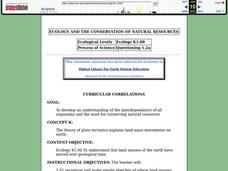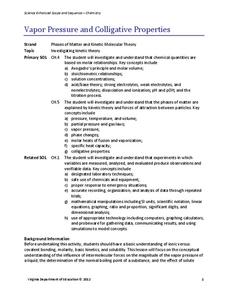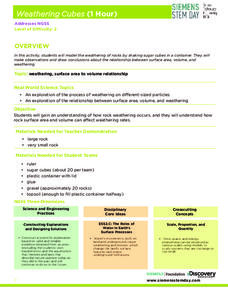Curated OER
Th'evenin's, Norton's, and Maximum Power Transfer Theorems
In this scientific theory activity, the student is asked 46 questions about equivalent circuits designed with differently constructed power sources. The answers are available if the student is working online.
Curated OER
In Search of a Land Ethic
Students research the theory that everything is connected to everything else. Students explore the concept of how do we put normative values on our nonhuman environment. Students investigate an ecologist and write an informational...
Curated OER
Bermuda Triangle
Young scholars explore what the Bermuda triangle is and the theories as to why it is so mysterious. In this mystery lesson students read and discuss the history and the mystery behind the Bermuda Triangle.
Curated OER
Lamarck Is Dead!
Students read Lamarck's obituary and respond to questions. They discuss the four laws from Lamarack's studies. Students apply this information to scientific theories in general.
Curated OER
Evolution, Genes, and Behavior
Students examine the roles of genes and evolution on behaviors. In groups, they identify the relationships among DNA, genes and chromosomes. They evaluate the different theories of language acquistion and how evolved tendencies interact...
American Chemical Society
Joseph Priestley, Discoverer of Oxygen
Do you want to hear a joke about nitrogen and oxygen? NO. We all know there is oxygen in the air and that plants produce oxygen, but how was it discovered? Scholars read a handout, answer questions, and analyze material in the...
Curated OER
About Science
Students explain why physics is the basic science. They outline scientific methods by distinguishing among observations, facts, hypotheses, laws, and principles. Students describe the circumstances under which a hypothesis or law must be...
Curated OER
Scientific Inquiry: Periodic Motion
Students construct their own pendulum. In this physics lesson, students design an experiment to find the factors affecting its period. They formulate a conclusion based on experimental data.
Curated OER
Physicists or Philosophers?
Trace the sequential process of the developing theories of atomic structure in the early 20th century, show, in historical development, how scientists "know" things, how experiments are set up and how interpretations are drawn from them,...
Curated OER
Ecology And the Conservation of Natural Resources
Students study Alfred Wegener's theory of continental drift and how the continents were connected in one large land mass called Pangaea. They examine plate tectonics and the theory that the earth's surface is composed of large moving...
Curated OER
The Ocean Floor
Fifth graders discuss the process of sedimentation and the continental drift theory. They locate major structures on the ocean floor and they identify life forms at each level of the ocean.
Curated OER
Phosphate Testing Contract
Students examine how to prepare an experimental procedure. In this scientific method lesson students conduct an investigation on phosphate.
Curated OER
A New Society Project
Ninth graders examine the social and political movements of the Gilded Age and Progressive Era. In this American history lesson, 9th graders work in groups to form their own society and laws. Students make a diagram of their town and...
Curated OER
Time and Earth History Socratic Questions
Students develop a sense of geologic ("deep") time and the ways in which Earth scientists construct the geologic time scale. They study he major events that shaped Earth, including the origin and evolution of its lithosphere, atmosphere,...
Curated OER
Origins Video Questions
In this biology instructional activity, students complete 19 short answer questions about biodiversity and information obtained during a class video.
Curated OER
Basic Electric Circuits
Students calculate the resistance across a bank of resistors in a series, parallel and combined circuit. Using new vocabulary words, they define and describe them in a scientific manner. After stating Ohm's Law, they solve electrical...
Curated OER
Super Science By Any Means Necessary!
The animated S2 Unit will use the adventures of a Super Hero and her sidekick to teach basic science and math concepts. Educators can use comic books, Saturday Morning Cartoons and the adventures of Super Heroes to teach a nine-week...
Virginia Department of Education
Vapor Pressure and Colligative Properties
Hate to vacuum, but enjoy using a vacuum pump? Explore a lesson that starts with a demonstration of boiling water at various temperatures by using a vacuum pump. Then scholars design their own experiments to measure vapor pressure and...
Virginia Department of Education
States of Matter
Scientists have been studying exothermic reactions before they were cool. The lesson begins with a discussion and a demonstration of heat curves. Scholars then determine the heat of fusion of ice and the heat needed to boil water through...
Teach Engineering
Air Pollution in the Pacific Northwest
Scholars investigate levels of nitrogen dioxide in the Pacific Northwest by examining the role of nitrogen in air pollution and how remote sensing can be used to measure nitrogen levels. An Excel spreadsheet calculates the difference...
Virginia Department of Education
Thermochemistry: Heat and Chemical Changes
What makes particles attract? Here, learners engage in multiple activities that fully describe colligative properties and allow the ability to critically assess the importance of these properties in daily life. Young chemists conduct...
Curated OER
Animals and Humans
Students identify the functions of various body parts. They participate in the "Head, Shoulders, Knees, and Toes" song, draw a picture of themselves and other mammals, and create a traced outline of their body that they add features to....
Discovery Education
The Time of Our Life
Mammals are some of the newest organisms to appear on Earth. Young scholars complete an activity that results in a timeline showing the appearance of different types of living organisms. Provided with a list that spans from prokaryotes...
Discovery Education
Weathering Cubes
Weathering is not necessarily a result of the weather. Scholars conduct an experiment to explore the effect of surface area and volume on the weathering process. They create their own sugar cube rocks using the same number of cubes—but...

























